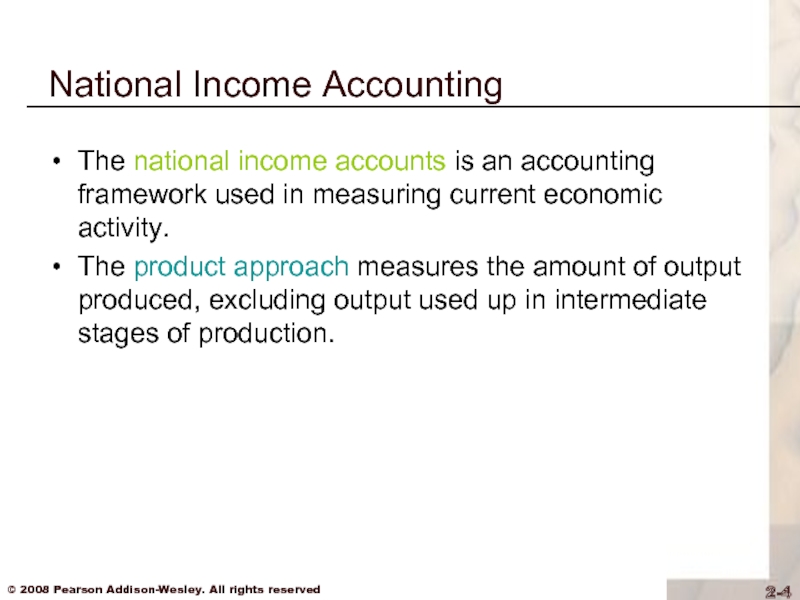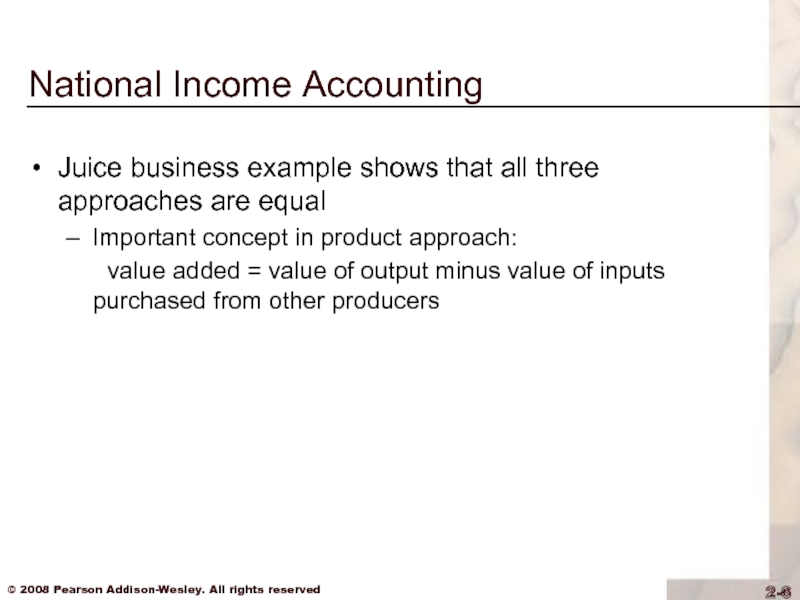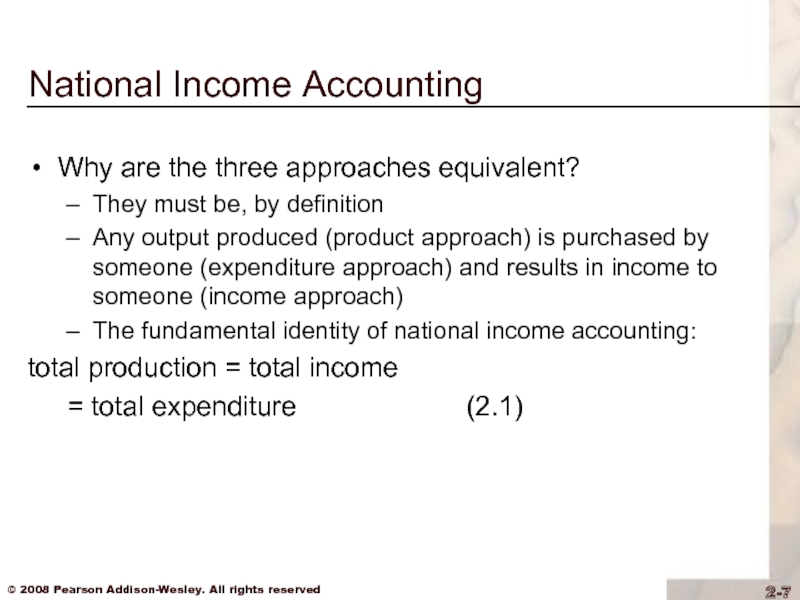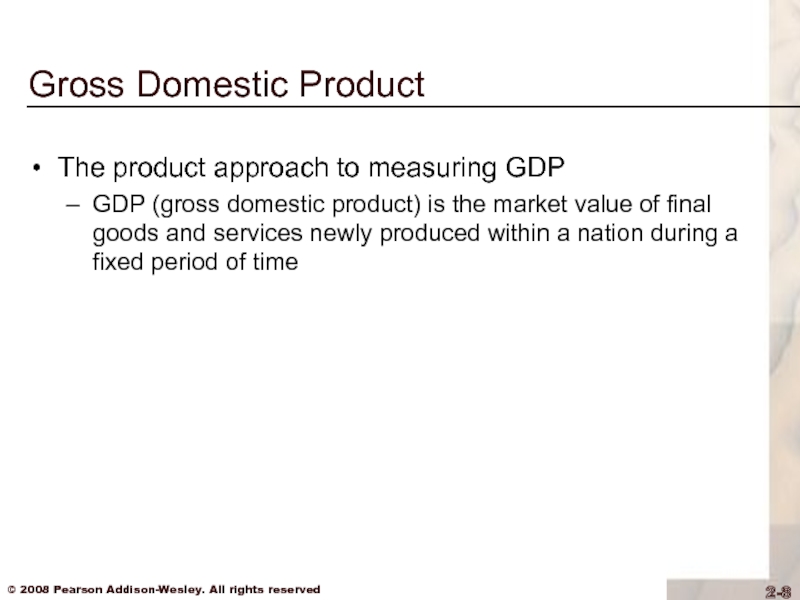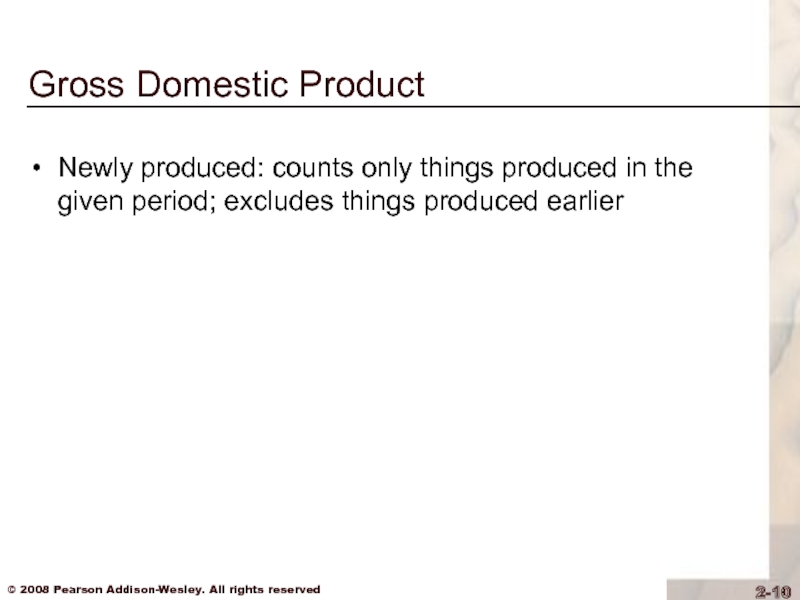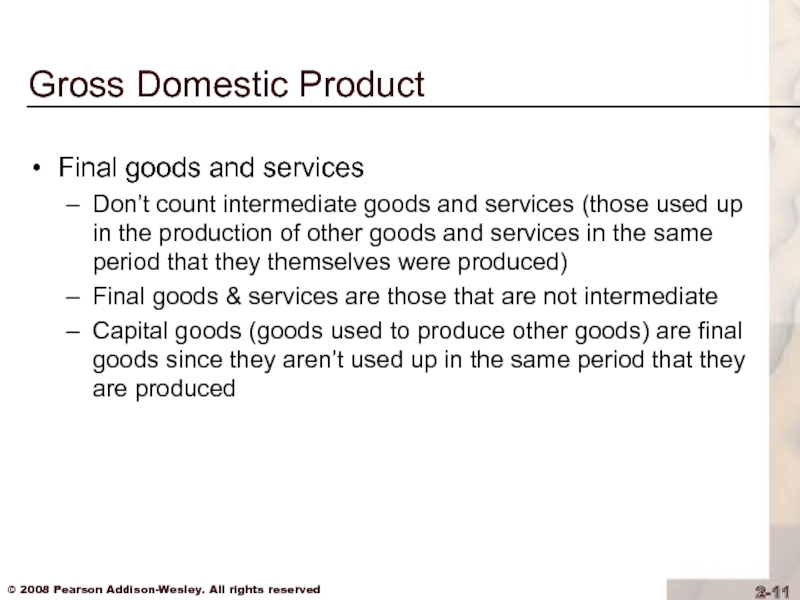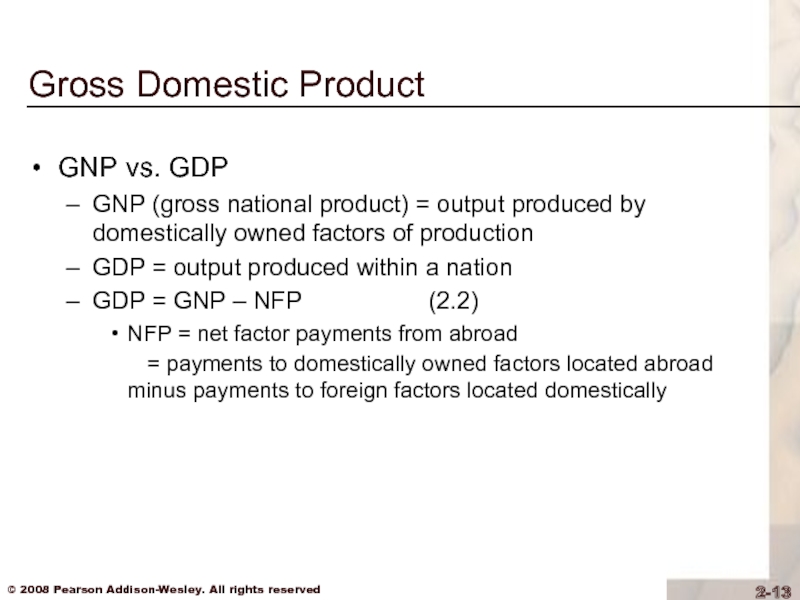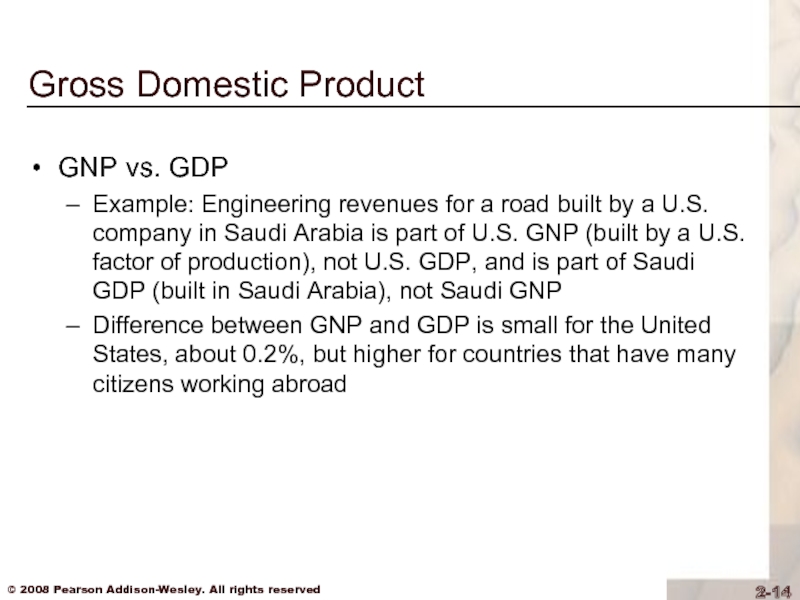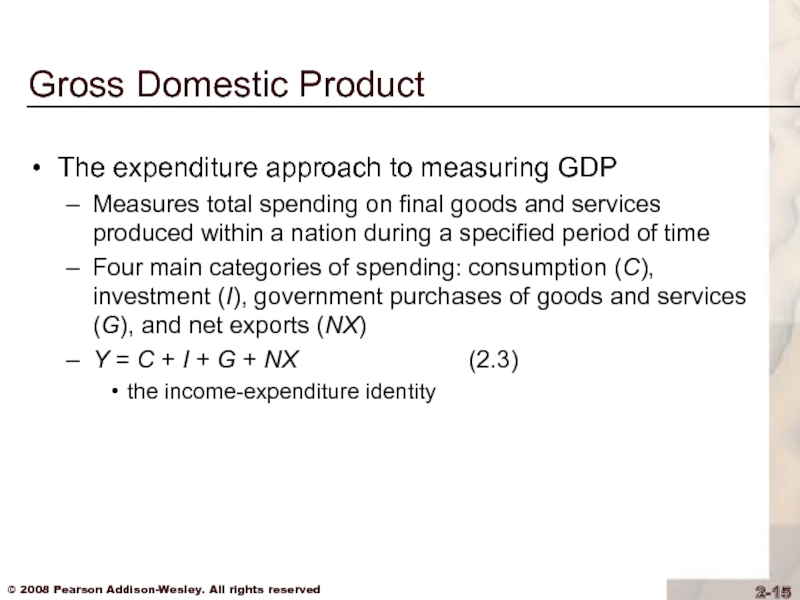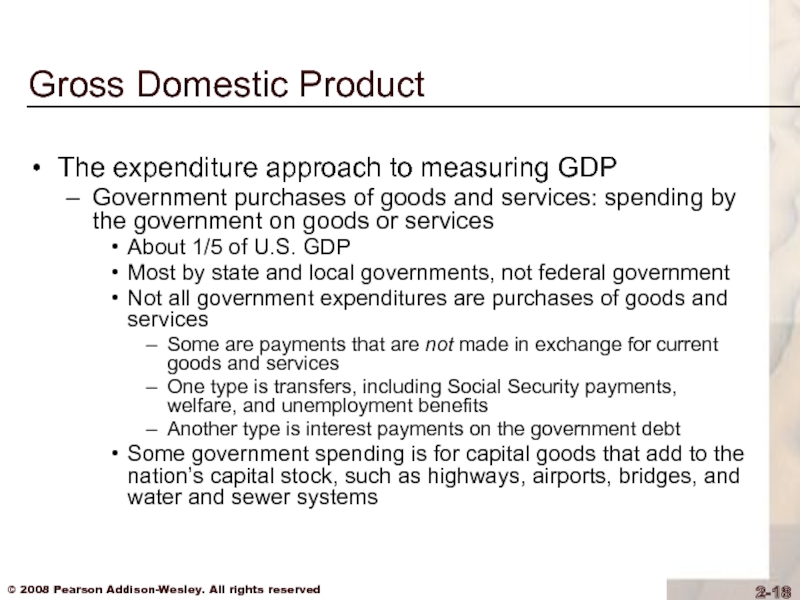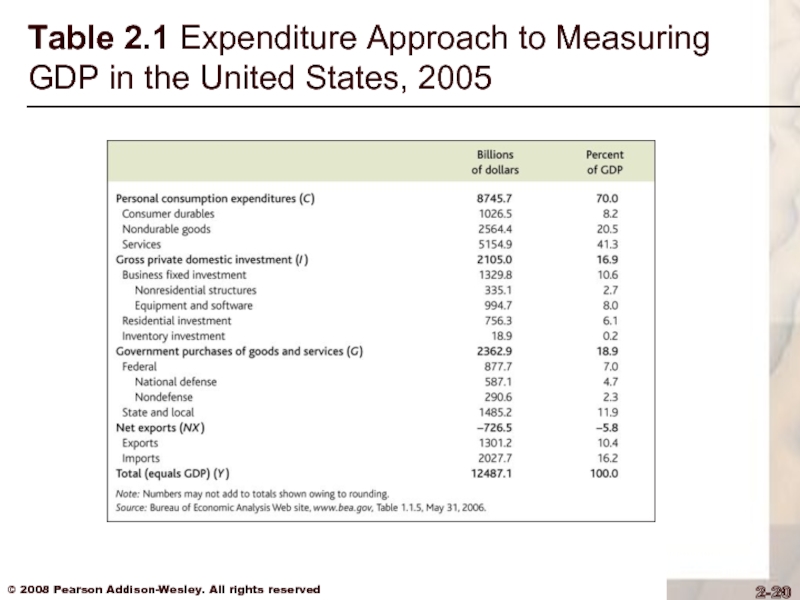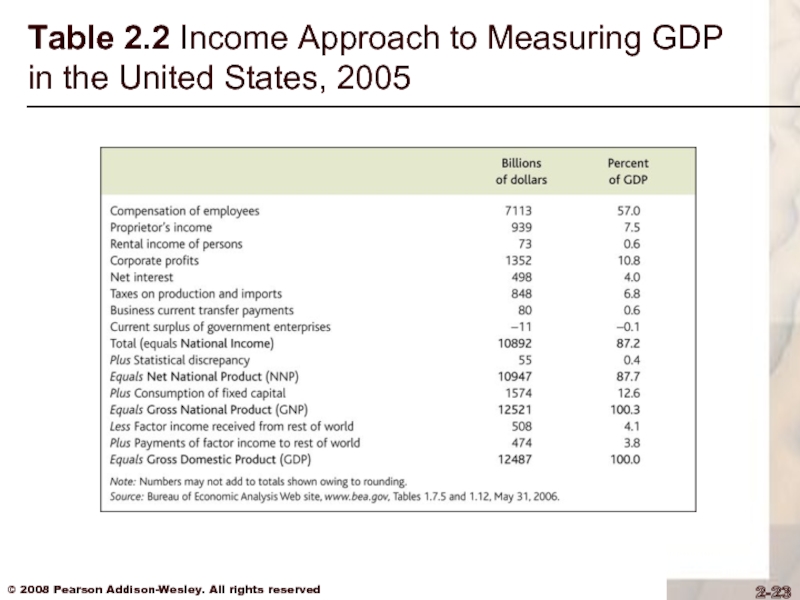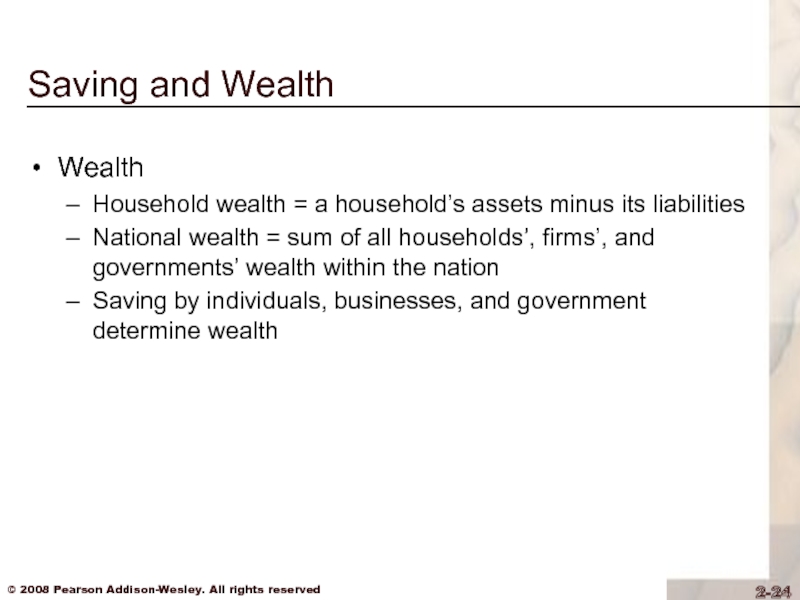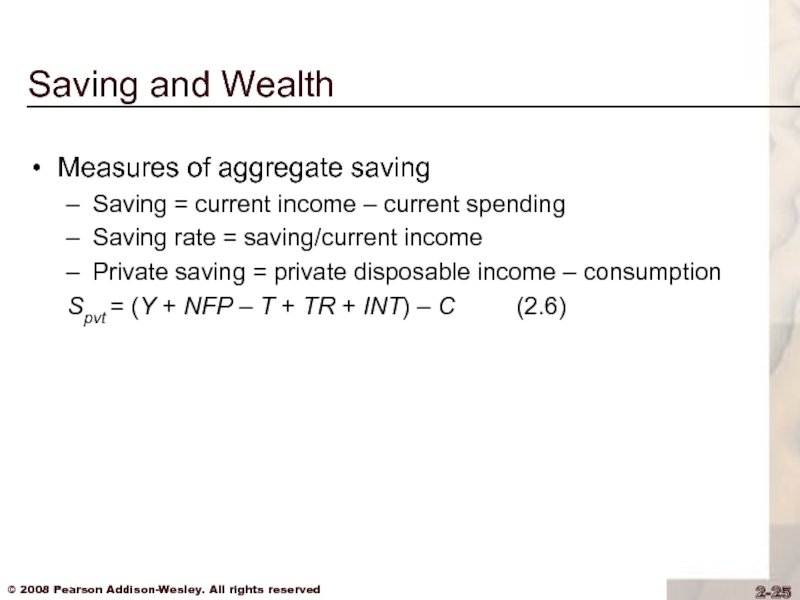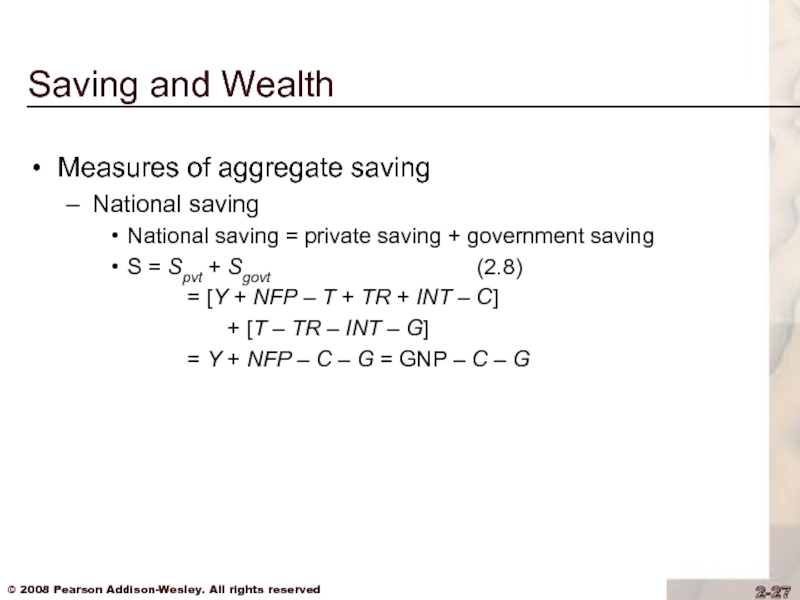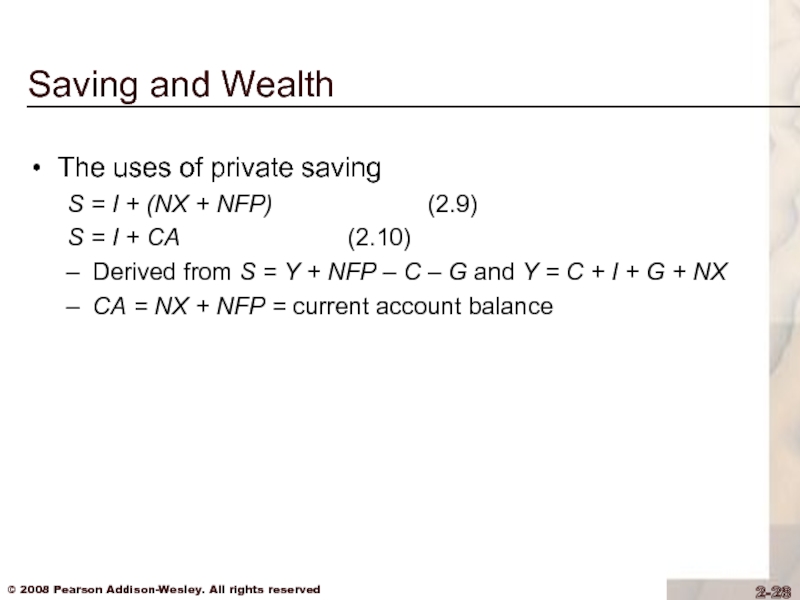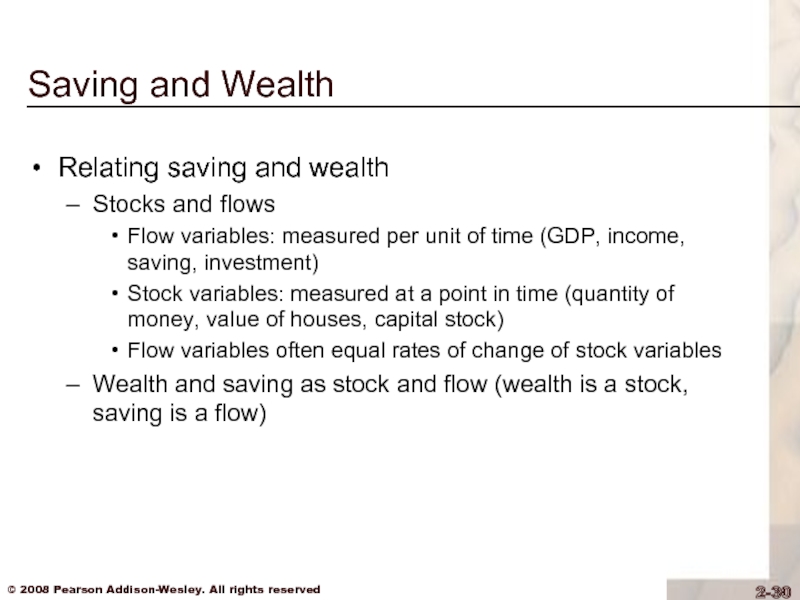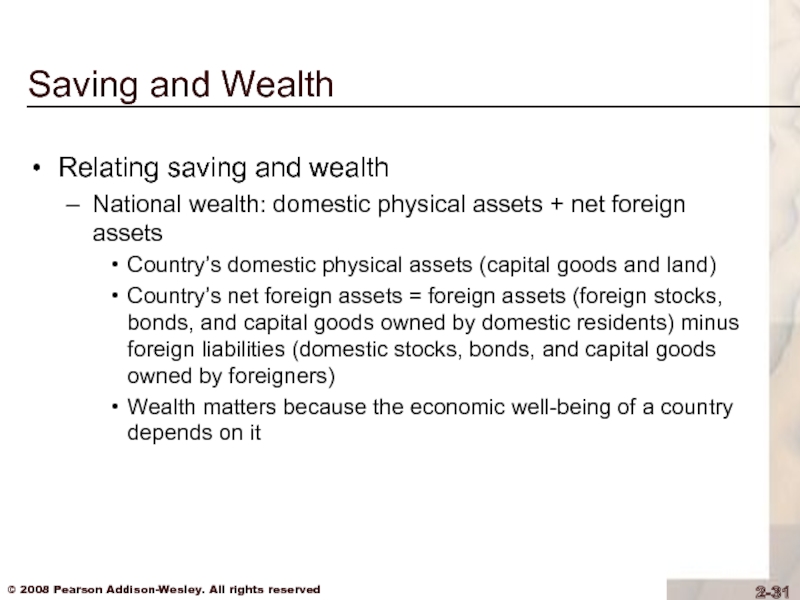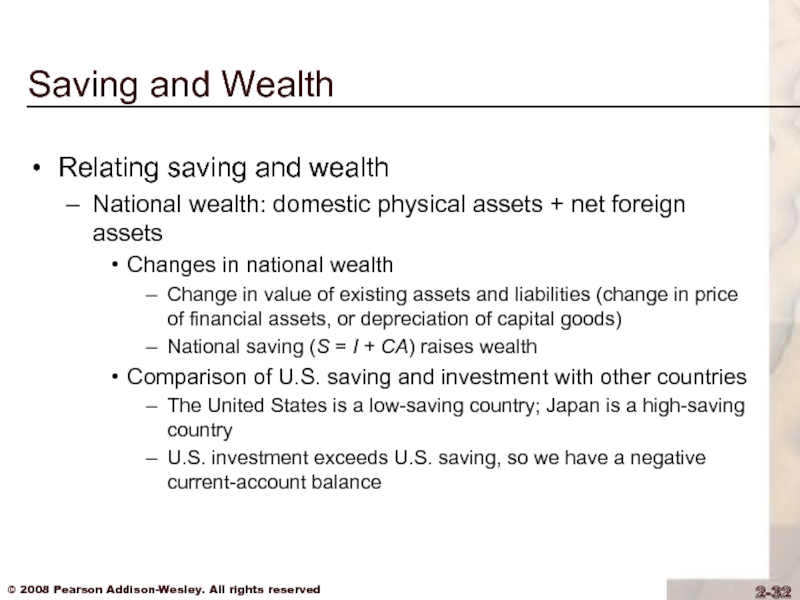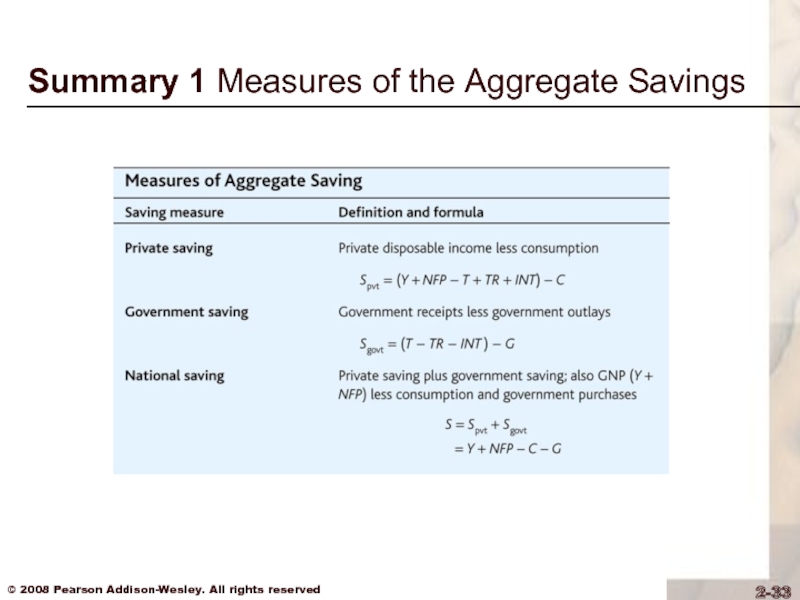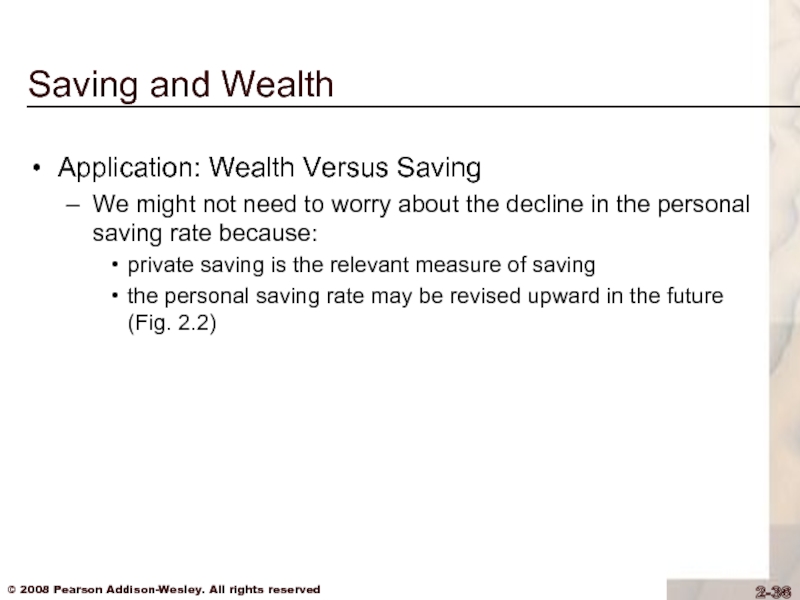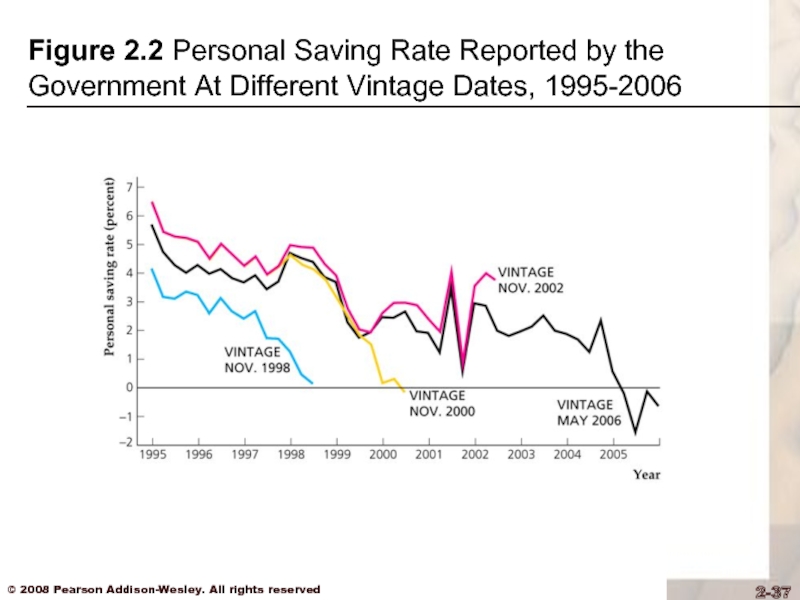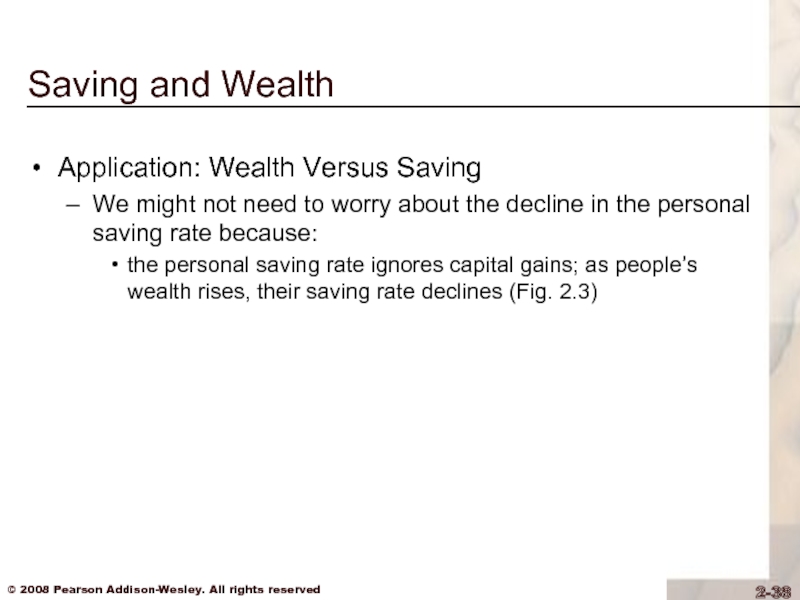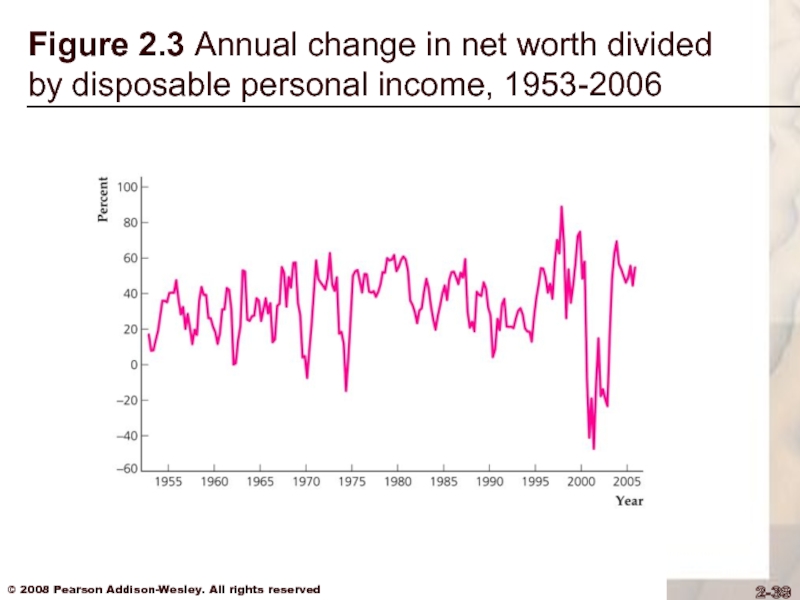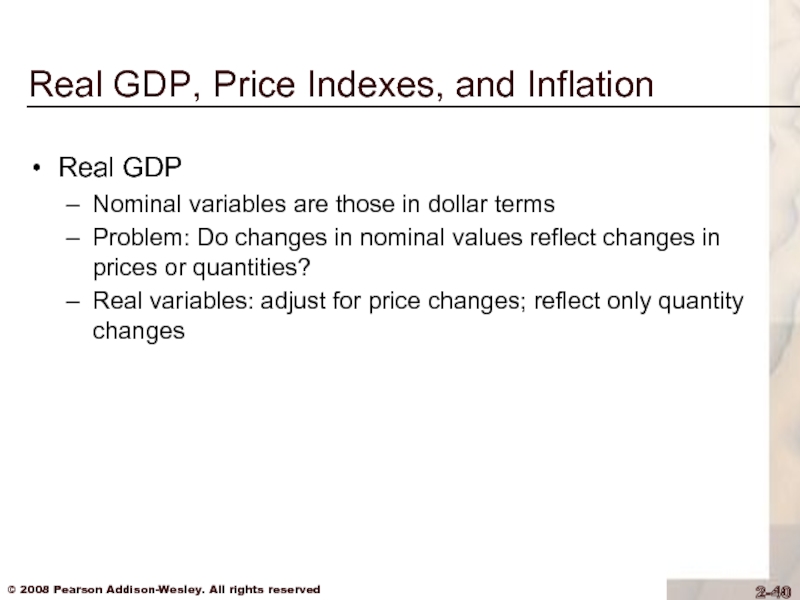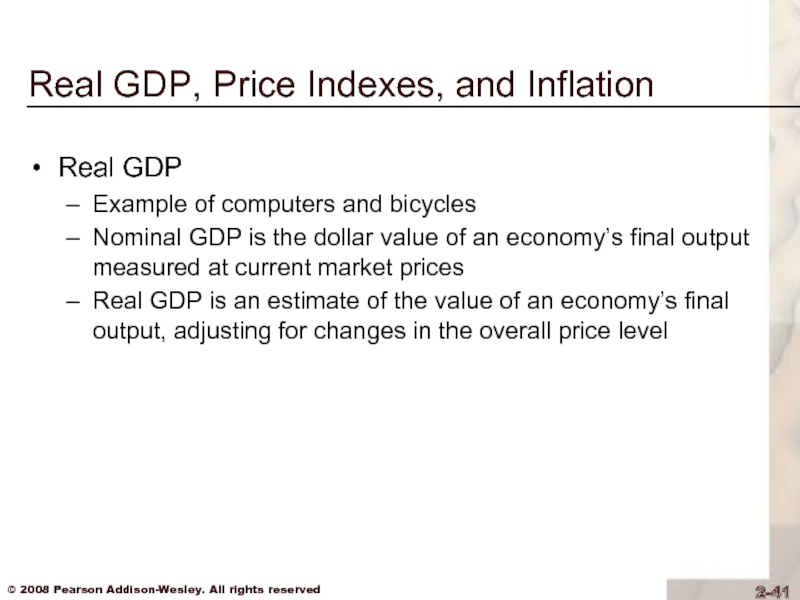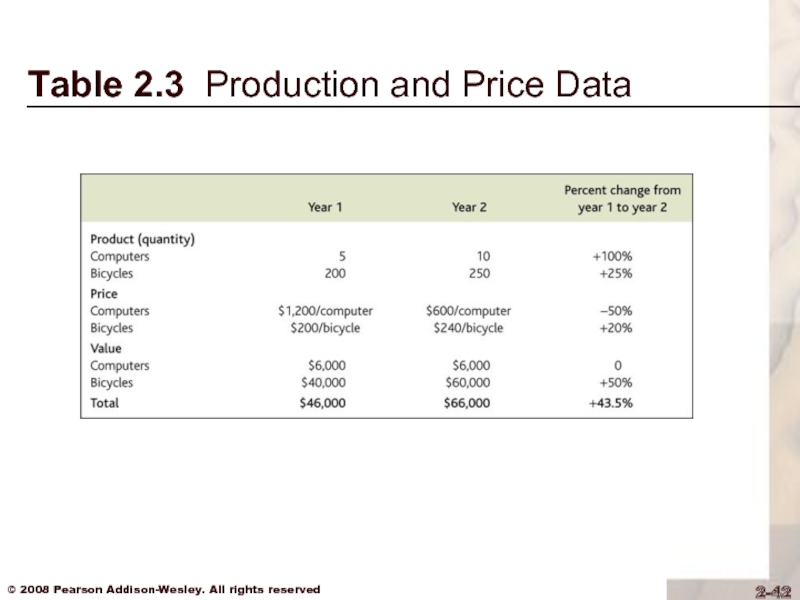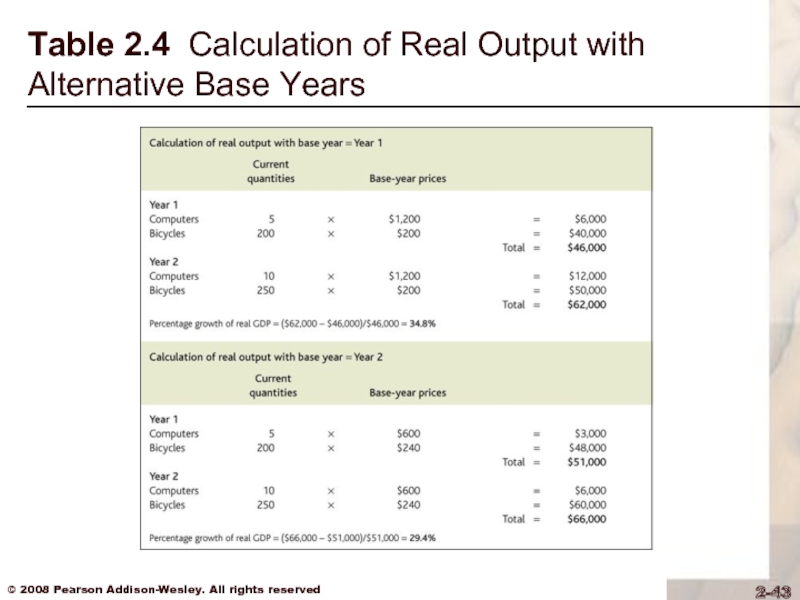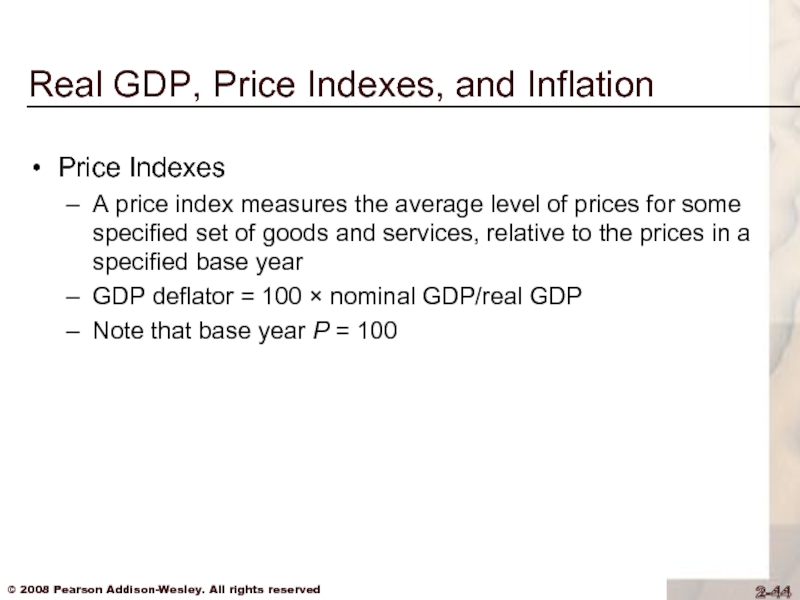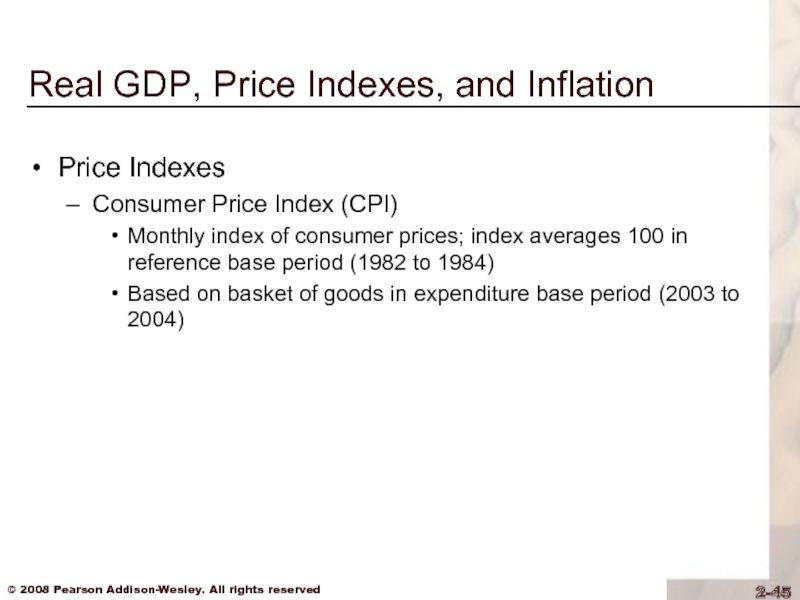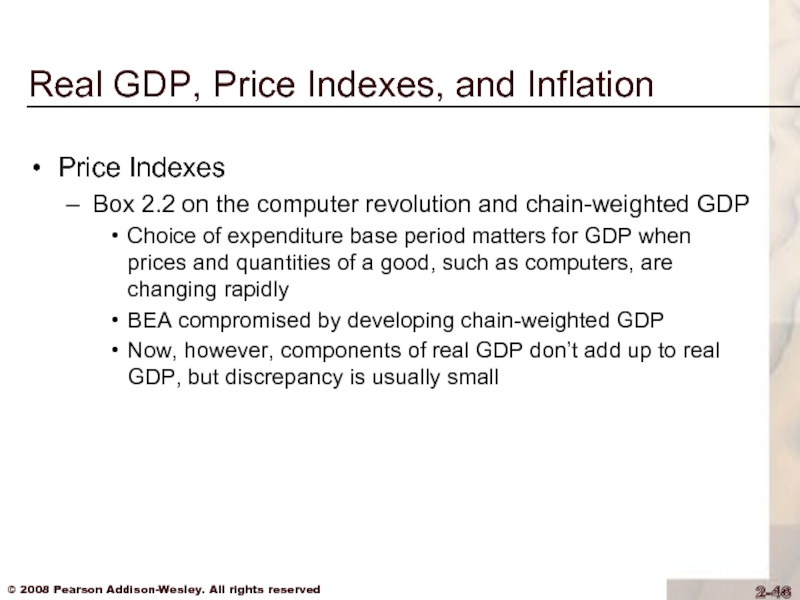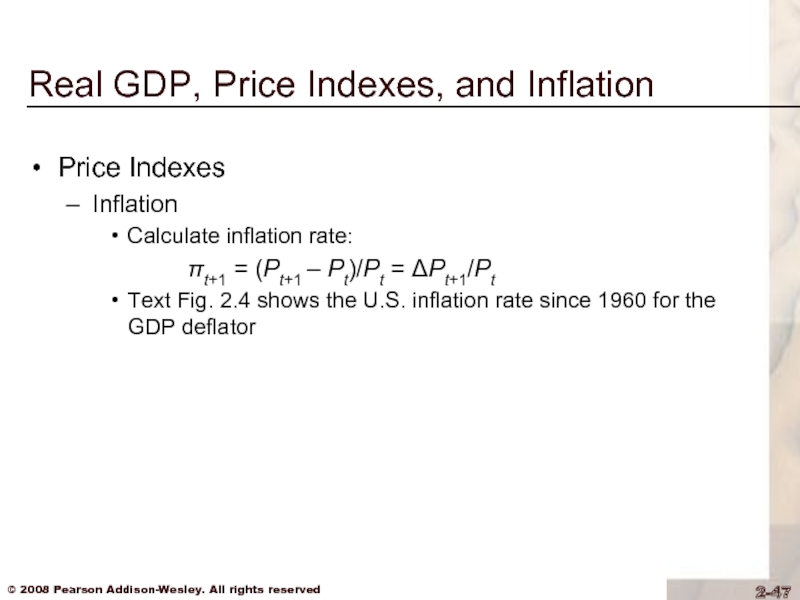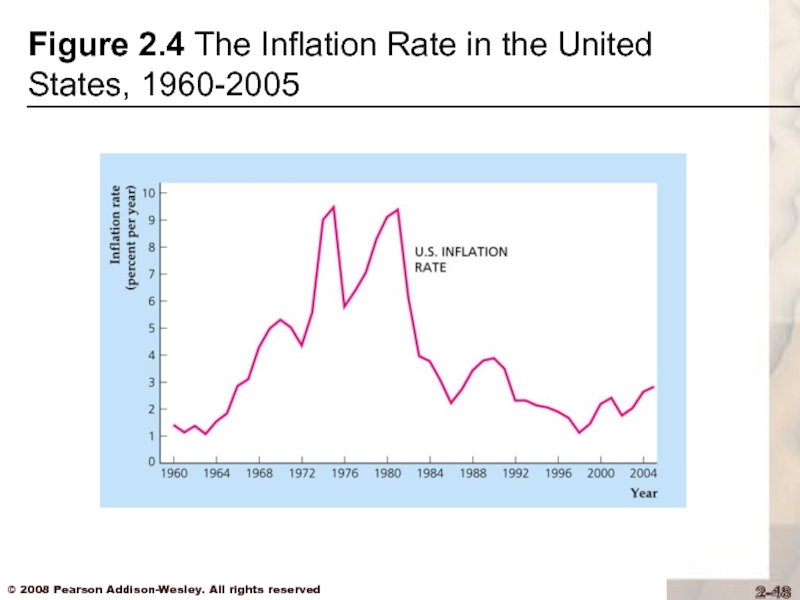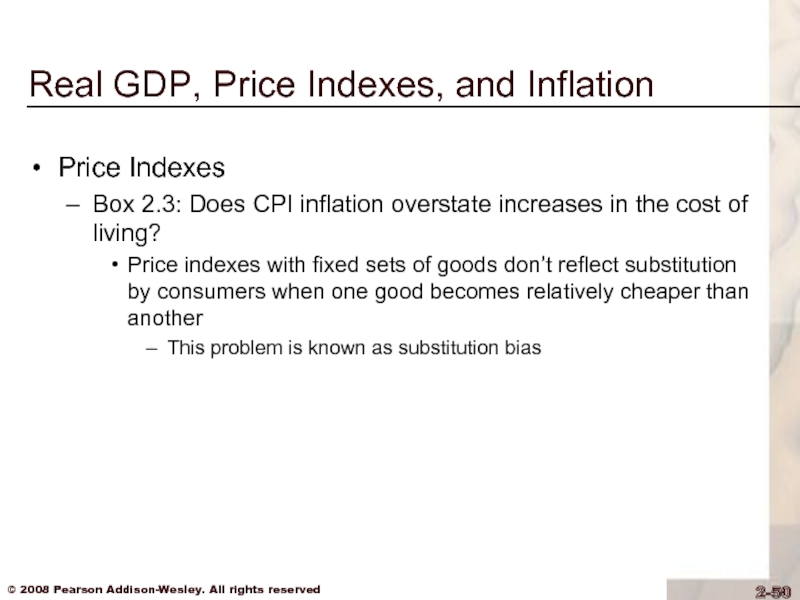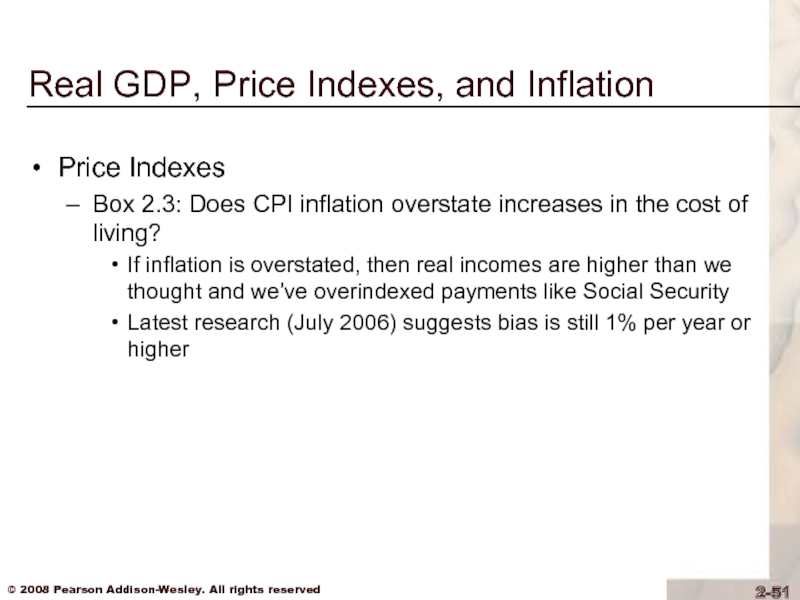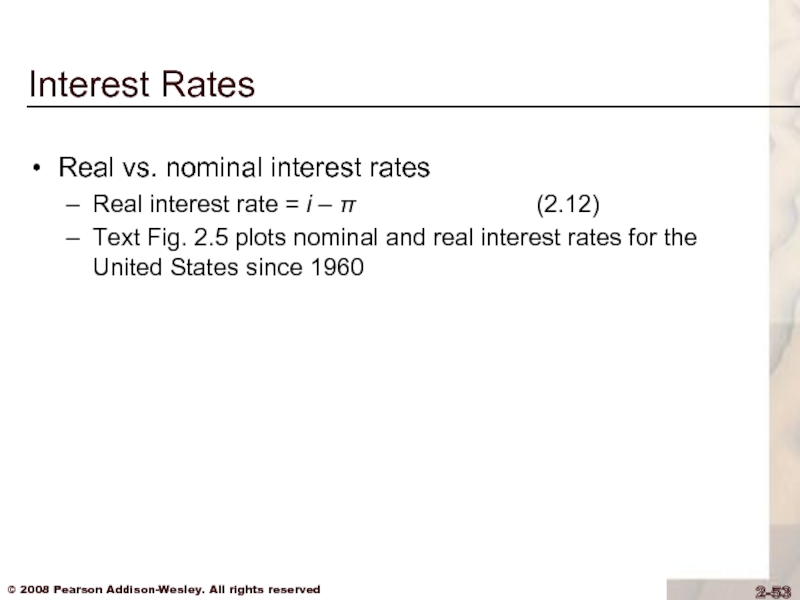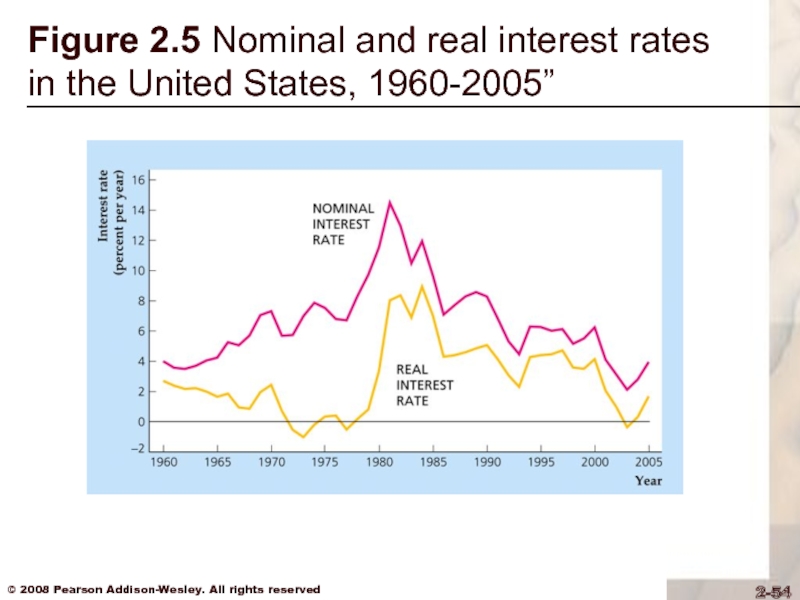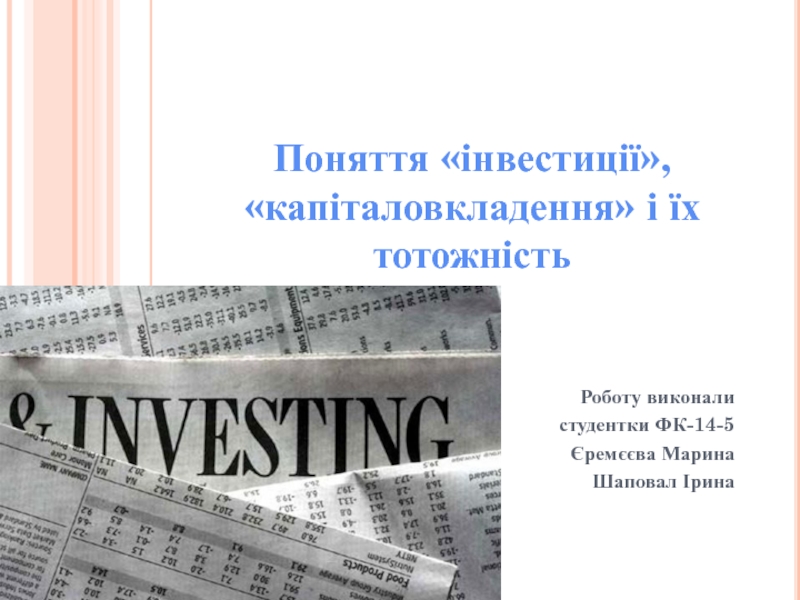- Главная
- Разное
- Дизайн
- Бизнес и предпринимательство
- Аналитика
- Образование
- Развлечения
- Красота и здоровье
- Финансы
- Государство
- Путешествия
- Спорт
- Недвижимость
- Армия
- Графика
- Культурология
- Еда и кулинария
- Лингвистика
- Английский язык
- Астрономия
- Алгебра
- Биология
- География
- Детские презентации
- Информатика
- История
- Литература
- Маркетинг
- Математика
- Медицина
- Менеджмент
- Музыка
- МХК
- Немецкий язык
- ОБЖ
- Обществознание
- Окружающий мир
- Педагогика
- Русский язык
- Технология
- Физика
- Философия
- Химия
- Шаблоны, картинки для презентаций
- Экология
- Экономика
- Юриспруденция
The measurement and structure of the national economy. (Chapter 2) презентация
Содержание
- 1. The measurement and structure of the national economy. (Chapter 2)
- 2. Chapter Outline National Income Accounting: The Measurement
- 3. National Income Accounting National income accounts: an
- 4. National Income Accounting The national income accounts
- 5. National Income Accounting (continued) The income approach
- 6. National Income Accounting Juice business example shows
- 7. National Income Accounting Why are the three
- 8. Gross Domestic Product The product approach to
- 9. Gross Domestic Product Market value: allows adding
- 10. Gross Domestic Product Newly produced: counts only
- 11. Gross Domestic Product Final goods and services
- 12. Gross Domestic Product Final goods and services
- 13. Gross Domestic Product GNP vs. GDP GNP
- 14. Gross Domestic Product GNP vs. GDP Example:
- 15. Gross Domestic Product The expenditure approach to
- 16. Gross Domestic Product The expenditure approach to
- 17. Gross Domestic Product The expenditure approach to
- 18. Gross Domestic Product The expenditure approach to
- 19. Gross Domestic Product The expenditure approach to
- 20. Table 2.1 Expenditure Approach to Measuring GDP in the United States, 2005
- 21. Gross Domestic Product The income approach to
- 22. Gross Domestic Product The income approach to
- 23. Table 2.2 Income Approach to Measuring GDP in the United States, 2005
- 24. Saving and Wealth Wealth Household wealth
- 25. Saving and Wealth Measures of aggregate saving
- 26. Saving and Wealth Measures of aggregate saving
- 27. Saving and Wealth Measures of aggregate saving
- 28. Saving and Wealth The uses of private
- 29. Saving and Wealth The uses of private
- 30. Saving and Wealth Relating saving and wealth
- 31. Saving and Wealth Relating saving and wealth
- 32. Saving and Wealth Relating saving and wealth
- 33. Summary 1 Measures of the Aggregate Savings
- 34. Saving and Wealth Application: Wealth Versus Saving
- 35. Figure 2.1 Personal Saving Rate, 1947-2006
- 36. Saving and Wealth Application: Wealth Versus Saving
- 37. Figure 2.2 Personal Saving Rate Reported by the Government At Different Vintage Dates, 1995-2006
- 38. Saving and Wealth Application: Wealth Versus Saving
- 39. Figure 2.3 Annual change in net worth divided by disposable personal income, 1953-2006
- 40. Real GDP, Price Indexes, and Inflation
- 41. Real GDP, Price Indexes, and Inflation
- 42. Table 2.3 Production and Price Data
- 43. Table 2.4 Calculation of Real Output with Alternative Base Years
- 44. Real GDP, Price Indexes, and Inflation
- 45. Real GDP, Price Indexes, and Inflation
- 46. Real GDP, Price Indexes, and Inflation
- 47. Real GDP, Price Indexes, and Inflation
- 48. Figure 2.4 The Inflation Rate in the United States, 1960-2005
- 49. Real GDP, Price Indexes, and Inflation
- 50. Real GDP, Price Indexes, and Inflation
- 51. Real GDP, Price Indexes, and Inflation
- 52. Interest Rates Real vs. nominal interest
- 53. Interest Rates Real vs. nominal interest
- 54. Figure 2.5 Nominal and real interest rates in the United States, 1960-2005”
- 55. Interest Rates The expected real interest
Слайд 2Chapter Outline
National Income Accounting: The Measurement of Production, Income, and Expenditure
Gross
Domestic Product
Saving and Wealth
Real GDP, Price Indexes, and Inflation
Interest Rates
Saving and Wealth
Real GDP, Price Indexes, and Inflation
Interest Rates
Слайд 3National Income Accounting
National income accounts: an accounting framework used in measuring
current economic activity
Three alternative approaches give the same measurements
Product approach: the amount of output produced
Income approach: the incomes generated by production
Expenditure approach: the amount of spending by purchasers
Three alternative approaches give the same measurements
Product approach: the amount of output produced
Income approach: the incomes generated by production
Expenditure approach: the amount of spending by purchasers
Слайд 4National Income Accounting
The national income accounts is an accounting framework used
in measuring current economic activity.
The product approach measures the amount of output produced, excluding output used up in intermediate stages of production.
The product approach measures the amount of output produced, excluding output used up in intermediate stages of production.
Слайд 5National Income Accounting (continued)
The income approach measures the incomes received by
the producers of output.
The expenditure approach measures the amount of spending by the ultimate purchasers of output.
The expenditure approach measures the amount of spending by the ultimate purchasers of output.
Слайд 6National Income Accounting
Juice business example shows that all three approaches are
equal
Important concept in product approach:
value added = value of output minus value of inputs purchased from other producers
Important concept in product approach:
value added = value of output minus value of inputs purchased from other producers
Слайд 7National Income Accounting
Why are the three approaches equivalent?
They must be, by
definition
Any output produced (product approach) is purchased by someone (expenditure approach) and results in income to someone (income approach)
The fundamental identity of national income accounting:
total production = total income
= total expenditure (2.1)
Any output produced (product approach) is purchased by someone (expenditure approach) and results in income to someone (income approach)
The fundamental identity of national income accounting:
total production = total income
= total expenditure (2.1)
Слайд 8Gross Domestic Product
The product approach to measuring GDP
GDP (gross domestic product)
is the market value of final goods and services newly produced within a nation during a fixed period of time
Слайд 9Gross Domestic Product
Market value: allows adding together unlike items by valuing
them at their market prices
Problem: misses nonmarket items such as homemaking, the value of environmental quality, and natural resource depletion
There is some adjustment to reflect the underground economy
Government services (that aren’t sold in markets) are valued at their cost of production
Problem: misses nonmarket items such as homemaking, the value of environmental quality, and natural resource depletion
There is some adjustment to reflect the underground economy
Government services (that aren’t sold in markets) are valued at their cost of production
Слайд 10Gross Domestic Product
Newly produced: counts only things produced in the given
period; excludes things produced earlier
Слайд 11Gross Domestic Product
Final goods and services
Don’t count intermediate goods and services
(those used up in the production of other goods and services in the same period that they themselves were produced)
Final goods & services are those that are not intermediate
Capital goods (goods used to produce other goods) are final goods since they aren’t used up in the same period that they are produced
Final goods & services are those that are not intermediate
Capital goods (goods used to produce other goods) are final goods since they aren’t used up in the same period that they are produced
Слайд 12Gross Domestic Product
Final goods and services
Inventory investment (the amount that inventories
of unsold finished goods, goods in process, and raw materials have changed during the period) is also treated as a final good
Adding up value added works well, since it automatically excludes intermediate goods
Adding up value added works well, since it automatically excludes intermediate goods
Слайд 13Gross Domestic Product
GNP vs. GDP
GNP (gross national product) = output produced
by domestically owned factors of production
GDP = output produced within a nation
GDP = GNP – NFP (2.2)
NFP = net factor payments from abroad
= payments to domestically owned factors located abroad minus payments to foreign factors located domestically
GDP = output produced within a nation
GDP = GNP – NFP (2.2)
NFP = net factor payments from abroad
= payments to domestically owned factors located abroad minus payments to foreign factors located domestically
Слайд 14Gross Domestic Product
GNP vs. GDP
Example: Engineering revenues for a road built
by a U.S. company in Saudi Arabia is part of U.S. GNP (built by a U.S. factor of production), not U.S. GDP, and is part of Saudi GDP (built in Saudi Arabia), not Saudi GNP
Difference between GNP and GDP is small for the United States, about 0.2%, but higher for countries that have many citizens working abroad
Difference between GNP and GDP is small for the United States, about 0.2%, but higher for countries that have many citizens working abroad
Слайд 15Gross Domestic Product
The expenditure approach to measuring GDP
Measures total spending on
final goods and services produced within a nation during a specified period of time
Four main categories of spending: consumption (C), investment (I), government purchases of goods and services (G), and net exports (NX)
Y = C + I + G + NX (2.3)
the income-expenditure identity
Four main categories of spending: consumption (C), investment (I), government purchases of goods and services (G), and net exports (NX)
Y = C + I + G + NX (2.3)
the income-expenditure identity
Слайд 16Gross Domestic Product
The expenditure approach to measuring GDP
Consumption: spending by domestic
households on final goods and services (including those produced abroad)
About 2/3 of U.S. GDP
Three categories
Consumer durables (examples: cars, TV sets, furniture, major appliances)
Nondurable goods (examples: food, clothing, fuel)
Services (examples: education, health care, financial services, transportation)
About 2/3 of U.S. GDP
Three categories
Consumer durables (examples: cars, TV sets, furniture, major appliances)
Nondurable goods (examples: food, clothing, fuel)
Services (examples: education, health care, financial services, transportation)
Слайд 17Gross Domestic Product
The expenditure approach to measuring GDP
Investment: spending for new
capital goods (fixed investment) plus inventory investment
About 1/6 of U.S. GDP
Business (or nonresidential) fixed investment: spending by businesses on structures and equipment and software
Residential fixed investment: spending on the construction of houses and apartment buildings
Inventory investment: increases in firms’ inventory holdings
About 1/6 of U.S. GDP
Business (or nonresidential) fixed investment: spending by businesses on structures and equipment and software
Residential fixed investment: spending on the construction of houses and apartment buildings
Inventory investment: increases in firms’ inventory holdings
Слайд 18Gross Domestic Product
The expenditure approach to measuring GDP
Government purchases of goods
and services: spending by the government on goods or services
About 1/5 of U.S. GDP
Most by state and local governments, not federal government
Not all government expenditures are purchases of goods and services
Some are payments that are not made in exchange for current goods and services
One type is transfers, including Social Security payments, welfare, and unemployment benefits
Another type is interest payments on the government debt
Some government spending is for capital goods that add to the nation’s capital stock, such as highways, airports, bridges, and water and sewer systems
About 1/5 of U.S. GDP
Most by state and local governments, not federal government
Not all government expenditures are purchases of goods and services
Some are payments that are not made in exchange for current goods and services
One type is transfers, including Social Security payments, welfare, and unemployment benefits
Another type is interest payments on the government debt
Some government spending is for capital goods that add to the nation’s capital stock, such as highways, airports, bridges, and water and sewer systems
Слайд 19Gross Domestic Product
The expenditure approach to measuring GDP
Net exports: exports minus
imports
Exports: goods produced in the country that are purchased by foreigners
Imports: goods produced abroad that are purchased by residents in the country
Imports are subtracted from GDP, as they represent goods produced abroad, and were included in consumption, investment, and government purchases
Exports: goods produced in the country that are purchased by foreigners
Imports: goods produced abroad that are purchased by residents in the country
Imports are subtracted from GDP, as they represent goods produced abroad, and were included in consumption, investment, and government purchases
Слайд 21Gross Domestic Product
The income approach to measuring GDP
Adds up income generated
by production (including profits and taxes paid to the government)
National income = compensation of employees (including benefits) + proprietors’ income + rental income of persons + corporate profits + net interest + taxes on production and imports + business current transfer payments + current surplus of government enterprises
National income + statistical discrepancy = net national product
Net national product + depreciation (the value of capital that wears out in the period) = gross national product (GNP)
GNP – net factor payments (NFP) = GDP
National income = compensation of employees (including benefits) + proprietors’ income + rental income of persons + corporate profits + net interest + taxes on production and imports + business current transfer payments + current surplus of government enterprises
National income + statistical discrepancy = net national product
Net national product + depreciation (the value of capital that wears out in the period) = gross national product (GNP)
GNP – net factor payments (NFP) = GDP
Слайд 22Gross Domestic Product
The income approach to measuring GDP
Private sector and government
sector income
Private disposable income = income of the private sector = private sector income earned at home (Y or GDP) and abroad (NFP) + payments from the government sector (transfers, TR, and interest on government debt, INT) – taxes paid to government (T) = Y + NFP + TR + INT – T (2.4)
Government’s net income = taxes – transfers – interest payments = T – TR – INT (2.5)
Private disposable income + government’s net income = GDP + NFP = GNP
Private disposable income = income of the private sector = private sector income earned at home (Y or GDP) and abroad (NFP) + payments from the government sector (transfers, TR, and interest on government debt, INT) – taxes paid to government (T) = Y + NFP + TR + INT – T (2.4)
Government’s net income = taxes – transfers – interest payments = T – TR – INT (2.5)
Private disposable income + government’s net income = GDP + NFP = GNP
Слайд 24Saving and Wealth
Wealth
Household wealth = a household’s assets minus its
liabilities
National wealth = sum of all households’, firms’, and governments’ wealth within the nation
Saving by individuals, businesses, and government determine wealth
National wealth = sum of all households’, firms’, and governments’ wealth within the nation
Saving by individuals, businesses, and government determine wealth
Слайд 25Saving and Wealth
Measures of aggregate saving
Saving = current income – current
spending
Saving rate = saving/current income
Private saving = private disposable income – consumption
Spvt = (Y + NFP – T + TR + INT) – C (2.6)
Saving rate = saving/current income
Private saving = private disposable income – consumption
Spvt = (Y + NFP – T + TR + INT) – C (2.6)
Слайд 26Saving and Wealth
Measures of aggregate saving
Government saving = net government income
– government purchases of goods and services
Sgovt = (T – TR – INT) – G (2.7)
Government saving = government budget surplus = government receipts – government outlays
Government receipts = tax revenue (T)
Government outlays = government purchases of goods and services (G) + transfers (TR) + interest payments on government debt (INT)
Government budget deficit = – Sgovt
Simplification: count government investment as government purchases, not investment
Sgovt = (T – TR – INT) – G (2.7)
Government saving = government budget surplus = government receipts – government outlays
Government receipts = tax revenue (T)
Government outlays = government purchases of goods and services (G) + transfers (TR) + interest payments on government debt (INT)
Government budget deficit = – Sgovt
Simplification: count government investment as government purchases, not investment
Слайд 27Saving and Wealth
Measures of aggregate saving
National saving
National saving = private saving
+ government saving
S = Spvt + Sgovt (2.8)
= [Y + NFP – T + TR + INT – C]
+ [T – TR – INT – G]
= Y + NFP – C – G = GNP – C – G
S = Spvt + Sgovt (2.8)
= [Y + NFP – T + TR + INT – C]
+ [T – TR – INT – G]
= Y + NFP – C – G = GNP – C – G
Слайд 28Saving and Wealth
The uses of private saving
S = I + (NX
+ NFP) (2.9)
S = I + CA (2.10)
Derived from S = Y + NFP – C – G and Y = C + I + G + NX
CA = NX + NFP = current account balance
S = I + CA (2.10)
Derived from S = Y + NFP – C – G and Y = C + I + G + NX
CA = NX + NFP = current account balance
Слайд 29Saving and Wealth
The uses of private saving
Spvt = I +
(–Sgovt) + CA (2.11)
(using S = Spvt + Sgovt)
The uses-of-saving identity—saving is used in three ways:
investment (I)
government budget deficit (–Sgovt)
current account balance (CA)
(using S = Spvt + Sgovt)
The uses-of-saving identity—saving is used in three ways:
investment (I)
government budget deficit (–Sgovt)
current account balance (CA)
Слайд 30Saving and Wealth
Relating saving and wealth
Stocks and flows
Flow variables: measured per
unit of time (GDP, income, saving, investment)
Stock variables: measured at a point in time (quantity of money, value of houses, capital stock)
Flow variables often equal rates of change of stock variables
Wealth and saving as stock and flow (wealth is a stock, saving is a flow)
Stock variables: measured at a point in time (quantity of money, value of houses, capital stock)
Flow variables often equal rates of change of stock variables
Wealth and saving as stock and flow (wealth is a stock, saving is a flow)
Слайд 31Saving and Wealth
Relating saving and wealth
National wealth: domestic physical assets +
net foreign assets
Country’s domestic physical assets (capital goods and land)
Country’s net foreign assets = foreign assets (foreign stocks, bonds, and capital goods owned by domestic residents) minus foreign liabilities (domestic stocks, bonds, and capital goods owned by foreigners)
Wealth matters because the economic well-being of a country depends on it
Country’s domestic physical assets (capital goods and land)
Country’s net foreign assets = foreign assets (foreign stocks, bonds, and capital goods owned by domestic residents) minus foreign liabilities (domestic stocks, bonds, and capital goods owned by foreigners)
Wealth matters because the economic well-being of a country depends on it
Слайд 32Saving and Wealth
Relating saving and wealth
National wealth: domestic physical assets +
net foreign assets
Changes in national wealth
Change in value of existing assets and liabilities (change in price of financial assets, or depreciation of capital goods)
National saving (S = I + CA) raises wealth
Comparison of U.S. saving and investment with other countries
The United States is a low-saving country; Japan is a high-saving country
U.S. investment exceeds U.S. saving, so we have a negative current-account balance
Changes in national wealth
Change in value of existing assets and liabilities (change in price of financial assets, or depreciation of capital goods)
National saving (S = I + CA) raises wealth
Comparison of U.S. saving and investment with other countries
The United States is a low-saving country; Japan is a high-saving country
U.S. investment exceeds U.S. saving, so we have a negative current-account balance
Слайд 34Saving and Wealth
Application: Wealth Versus Saving
The personal saving rate has declined
dramatically in recent years (Fig. 2.1)
Слайд 36Saving and Wealth
Application: Wealth Versus Saving
We might not need to worry
about the decline in the personal saving rate because:
private saving is the relevant measure of saving
the personal saving rate may be revised upward in the future (Fig. 2.2)
private saving is the relevant measure of saving
the personal saving rate may be revised upward in the future (Fig. 2.2)
Слайд 37Figure 2.2 Personal Saving Rate Reported by the Government At Different
Vintage Dates, 1995-2006
Слайд 38Saving and Wealth
Application: Wealth Versus Saving
We might not need to worry
about the decline in the personal saving rate because:
the personal saving rate ignores capital gains; as people’s wealth rises, their saving rate declines (Fig. 2.3)
the personal saving rate ignores capital gains; as people’s wealth rises, their saving rate declines (Fig. 2.3)
Слайд 40Real GDP, Price Indexes, and Inflation
Real GDP
Nominal variables are those
in dollar terms
Problem: Do changes in nominal values reflect changes in prices or quantities?
Real variables: adjust for price changes; reflect only quantity changes
Problem: Do changes in nominal values reflect changes in prices or quantities?
Real variables: adjust for price changes; reflect only quantity changes
Слайд 41Real GDP, Price Indexes, and Inflation
Real GDP
Example of computers and
bicycles
Nominal GDP is the dollar value of an economy’s final output measured at current market prices
Real GDP is an estimate of the value of an economy’s final output, adjusting for changes in the overall price level
Nominal GDP is the dollar value of an economy’s final output measured at current market prices
Real GDP is an estimate of the value of an economy’s final output, adjusting for changes in the overall price level
Слайд 44Real GDP, Price Indexes, and Inflation
Price Indexes
A price index
measures the average level of prices for some specified set of goods and services, relative to the prices in a specified base year
GDP deflator = 100 × nominal GDP/real GDP
Note that base year P = 100
GDP deflator = 100 × nominal GDP/real GDP
Note that base year P = 100
Слайд 45Real GDP, Price Indexes, and Inflation
Price Indexes
Consumer Price Index
(CPI)
Monthly index of consumer prices; index averages 100 in reference base period (1982 to 1984)
Based on basket of goods in expenditure base period (2003 to 2004)
Monthly index of consumer prices; index averages 100 in reference base period (1982 to 1984)
Based on basket of goods in expenditure base period (2003 to 2004)
Слайд 46Real GDP, Price Indexes, and Inflation
Price Indexes
Box 2.2 on
the computer revolution and chain-weighted GDP
Choice of expenditure base period matters for GDP when prices and quantities of a good, such as computers, are changing rapidly
BEA compromised by developing chain-weighted GDP
Now, however, components of real GDP don’t add up to real GDP, but discrepancy is usually small
Choice of expenditure base period matters for GDP when prices and quantities of a good, such as computers, are changing rapidly
BEA compromised by developing chain-weighted GDP
Now, however, components of real GDP don’t add up to real GDP, but discrepancy is usually small
Слайд 47Real GDP, Price Indexes, and Inflation
Price Indexes
Inflation
Calculate inflation rate:
πt+1 = (Pt+1 – Pt)/Pt = ΔPt+1/Pt
Text Fig. 2.4 shows the U.S. inflation rate since 1960 for the GDP deflator
Слайд 49Real GDP, Price Indexes, and Inflation
Price Indexes
Box 2.3: Does
CPI inflation overstate increases in the cost of living?
The Boskin Commission reported that the CPI was biased upwards by as much as one to two percentage points per year
One problem is that adjusting the price measures for changes in the quality of goods is very difficult
The Boskin Commission reported that the CPI was biased upwards by as much as one to two percentage points per year
One problem is that adjusting the price measures for changes in the quality of goods is very difficult
Слайд 50Real GDP, Price Indexes, and Inflation
Price Indexes
Box 2.3: Does
CPI inflation overstate increases in the cost of living?
Price indexes with fixed sets of goods don’t reflect substitution by consumers when one good becomes relatively cheaper than another
This problem is known as substitution bias
Price indexes with fixed sets of goods don’t reflect substitution by consumers when one good becomes relatively cheaper than another
This problem is known as substitution bias
Слайд 51Real GDP, Price Indexes, and Inflation
Price Indexes
Box 2.3: Does
CPI inflation overstate increases in the cost of living?
If inflation is overstated, then real incomes are higher than we thought and we’ve overindexed payments like Social Security
Latest research (July 2006) suggests bias is still 1% per year or higher
If inflation is overstated, then real incomes are higher than we thought and we’ve overindexed payments like Social Security
Latest research (July 2006) suggests bias is still 1% per year or higher
Слайд 52Interest Rates
Real vs. nominal interest rates
Interest rate: a rate of
return promised by a borrower to a lender
Real interest rate: rate at which the real value of an asset increases over time
Nominal interest rate: rate at which the nominal value of an asset increases over time
Real interest rate: rate at which the real value of an asset increases over time
Nominal interest rate: rate at which the nominal value of an asset increases over time
Слайд 53Interest Rates
Real vs. nominal interest rates
Real interest rate = i
– π (2.12)
Text Fig. 2.5 plots nominal and real interest rates for the United States since 1960
Text Fig. 2.5 plots nominal and real interest rates for the United States since 1960
Слайд 55Interest Rates
The expected real interest rate
r = i – πe
(2.13)
If π = πe, real interest rate = expected real interest rate
If π = πe, real interest rate = expected real interest rate



